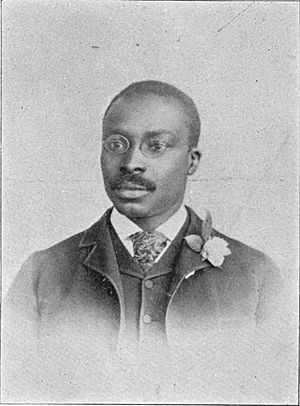Orishatukeh Faduma facts for kids
Quick facts for kids
Orishatukeh Faduma
|
|
|---|---|
 |
|
| Born | September 15, 1855 |
| Died | January 25, 1946 (aged 90) |
| Other names | Williams James Davies |
| Alma mater | Wesleyan Boys High School Methodist Boys High School Yale University University of London |
| Occupation | missionary educator |
| Known for | being the First African student of Yale Divinity School; First West African student of the University of London; Educator in the United States and Christian Missionary work in Sierra Leone |
| Spouse(s) |
Henrietta Adams
(m. 1895) |
| Children | Omojowu Faduma Du Bois Faduma |
Orishatukeh Faduma (born September 15, 1855, in Guyana – died January 25, 1946, in High Point, North Carolina) was an African-American Christian missionary and educator. He was also a strong supporter of African culture. His work helped create the foundation for future studies about Africa.
Contents
Early Life and Family
Orishatukeh Faduma was born to John and Omolofi Faduma. His parents were Yoruba people who had been rescued from slavery. They were almost sold as slaves in the United States. Luckily, the British navy rescued them while they were at sea in the Atlantic Ocean.
When Faduma was seven years old, his family moved to Sierra Leone. He was baptized there and given the Christian name "William James Davis." He used this name until 1887. Then, he proudly changed it back to his original Yoruba name, "Orishatukeh Faduma."
Education and Teaching Career
Early Schooling and Inspiration
Faduma attended Wesleyan Boys High School. He lived with the school's principal, Reverend Claudius May. Reverend May greatly inspired Faduma's lifelong love for education and teaching. After graduating, Faduma stayed at the school as an assistant teacher.
He also attended another Christian school, Methodist Boys High School.
Studying in England and Return to Africa
Faduma traveled to England to continue his studies. In 1884, he became the first West African student to earn a Bachelor of Arts degree from the University of London.
After his studies in England, Faduma returned to Sierra Leone to teach. From 1885 to 1891, he was a senior master at the Methodist Boys High School. During this time, in 1887, he helped start a group called the Dress Reform Society. This group, which included important people like Dr. Edward Blyden, encouraged people to wear traditional African robes instead of the Western-style clothes that were common then.
Studying and Working in the United States
In 1891, Faduma went to the United States to study even more. He was one of the few Africans to do so at that time. He received a scholarship of $400 to study philosophy and religion at Yale Divinity School. He was the first African student to enroll there.
He earned a bachelor's degree from Yale University. Then, he continued his advanced studies at Yale Divinity School, graduating in 1895. After that, he lived in the United States and became a U.S. citizen in 1902.
From 1891 to 1895, he worked with the American Missionary Association. He was also a minister for the African Methodist Episcopal Church.
Leading Peabody Academy
From 1895 to 1914, Faduma was the principal and pastor at Peabody Academy in Troy, North Carolina. This school was started in 1880 to educate African Americans.
Sharing His Knowledge
Faduma was very active in sharing his ideas.
- In 1892, he was part of an important council on African culture at the World's Exposition in Chicago.
- In 1894, he spoke at a missionary meeting in Rochester, New York, about "Industrial Missions in Africa."
- In 1895, he attended a missionary conference in Atlanta, Georgia. There, he gave two talks: one about Yoruba religion and another about missionary work in Africa. This was around the same time that Booker T. Washington, a famous leader for black Americans, gave his "Atlanta Compromise" speech.
Faduma also joined the American Negro Academy in New York. This group was formed in 1904 by important African-American thinkers. They wanted to share their views on the well-being of black people. Faduma was the only African to speak to the Academy. His topic was "The Defects of the Negro Church."
Return to Sierra Leone and Later Teaching
After returning to Sierra Leone in 1918, Faduma became the principal of the United Methodist Collegiate School from 1916 to 1918. From 1918 to 1923, he worked as an inspector, instructor, and officer-in-charge of the model school.
In 1924, Faduma came back to the United States and continued teaching until 1939. He was an assistant principal and teacher at Lincoln Academy in Kings Mountain. He taught Latin, ancient and modern history, and English Literature. He made sure that young women learned sewing and cooking skills before they graduated.
In 1923, Faduma also taught at the Virginia Theological Seminary and College in Lynchburg.
Personal Life
In September 1895, Orishatukeh Faduma married Henrietta Adams, who was also a teacher at Peabody Academy. They had two sons. Their first son, Omojowu, was born in 1902. Their second son, Du Bois, born in 1922, was likely named after the famous American scholar and civil rights activist, W. E. B. Du Bois.
Orishatukeh Faduma passed away in 1946 and was buried in High Point, North Carolina.
 | Jackie Robinson |
 | Jack Johnson |
 | Althea Gibson |
 | Arthur Ashe |
 | Muhammad Ali |

